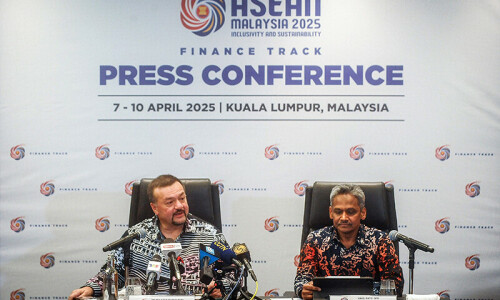THE onslaught of militancy in erstwhile Fata resulted in irreparable human loss, displacement and destruction and exposed the flaws in the indirect administrative system assisted by the maliks. To understand what led to the decline of the maliks, one must examine how they served the interests of the administration.
‘Malik’ is a hereditary title given to tribal elders with some authority to make decisions about their tribes. After the second Anglo-Afghan War (1878-80), a forward policy was introduced to pacify and establish direct contact with the tribes. The British Indian government started a system of allowances (muwajib), and the political agents — with the governor’s approval — granted the status of ‘maliks’ to tribal elders who played the role of local-level intermediaries between the administration and the tribes. They were entitled to an allowance in return for ensuring general good behaviour, maintaining border security and controlling raiders.
They were key figures in the tribal areas’ sociopolitical fabric. Their words carried weight: as arbitrators between the locals and the administration, they had significant influence in social and official circles. However, the nomination of the maliks and payment of allowance to them was against the Pakhtuns’ egalitarian social fabric. Further, by doing so the British also took advantage of tribal rivalries.
After independence, the Pakistan government continued the maliki system, paying allowances and subsidies to the maliks and, in return, the tribes declared their loyalty to Pakistan.
The ‘maliki’ system clashed with the egalitarian social fabric.
The temptation of acquiring privileges and benefits multiplied their numbers. At one time, there were at least 33,437 maliks including 2,300 in South Waziristan (1,700 from Mehsud and 600 from the Ahmadzai Wazir tribes, 1,600 in North Waziristan, and 8,836 in Orakzai, 7,300 in Bajaur, 9,833 in Mohmand and 3,568 in Khyber). Maliks were also influential in the Frontier Regions.
During the Afghan jihad, while the clergy gained space in Fata, the rise of the Taliban in Afghanistan and the advent of Arab fighters in Fata reduced space for the maliks. Hundreds of them were killed in targeted militant attacks. Prolonged conflict diluted the authority of jirgas, hence facilitating de-tribalisation.
During 1973-1997, the maliks were dominant in Fata. Before the introduction of adult franchise in 1996, they constituted the electoral college for the National Assembly. It was a prominent role that enabled many of them to amass further influence, land and wealth, thereby increasing the gulf between the haves and the have-nots. Their right to vote kept common folk disenfranchised. When universal adult franchise was extended to the tribal areas, it diluted their monopoly. Educational progress and job opportunities in the Middle East gave rise to a middle class and, consequently, an unspoken resentment of the maliks.
There were two reasons why the maliki system failed to bridge the gap between the state and the people. Firstly, the fact that maliks were not elected representatives hindered the bridging of this gap. Secondly, the maliki system only encouraged cooperation among the maliks, and they exploited the system to their advantage. Their preeminent status with hereditary rights conflicted with the egalitarian social fabric of Pakhtun society as well as the fundamentals of Pakhtunwali. The maliks also acted as government contractors, enabling them to profit from government-funded projects, and some ended up being accused of involvement in corrupt practices. Buying loyalties was an established norm in the maliki system, as a result of which public interest and public service were compromised.
Traditionally, in tribal areas, the clergy had little political authority whereas the maliks had significant influence in decision-making. The decline of the maliks actually began from the 1980s when a jihadist clergy tried to unite the tribes against the Soviet threat and provided shelter to foreign fighters on the pretext of jihad and the Pakhtunwali code. The foreign militants introduced new values to the area, and those who did not support them lost their lives. The new dynamic exposed the system’s weaknesses and eroded the maliks’ traditional authority.
Ultimately, after successful military operations in the area, bringing reforms in Fata was included as part of the 20-point National Action Plan. In 2018, the 25th Amendment merged the region with Khyber Pakhtunkhwa.
However, the work is far from complete. Without parliamentarians (particularly in the KP provincial assembly) playing an assertive role, and in the absence of promised funds, autonomous local bodies, community engagement, a fully functional criminal justice system and improved socioeconomic indicators, reforming Fata will remain an elusive ideal.
The writer is the author of Pakistan: In Between Extremism and Peace.
Twitter: @alibabakhel
Published in Dawn, November 29th, 2022













































